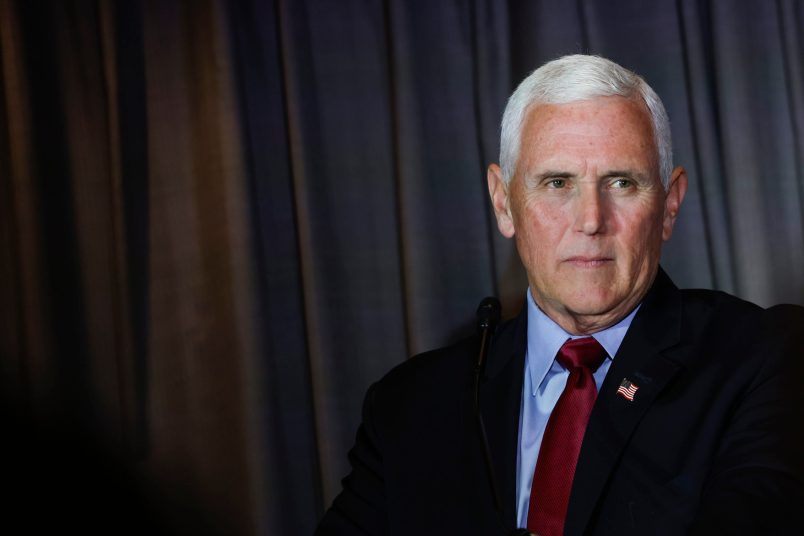Elsewhere, Republicans are running, with their hands up, shrieking, from the accusation (and for most, bare statement of fact) that they want to cut Social Security and Medicare. But not Mike Pence.
From glossy cable news sets to a relaxed hang with the National Association of Wholesaler-Distributors, Pence has been singularly fixated on airing his (very unpopular) plans to cut the programs all month.
Earlier in February, Yahoo News published video obtained by Democratic opposition research hub American Bridge of Pence addressing the wholesaler-distributors.
“I was a part of it when George W. Bush proposed Social Security reform in 2005,” he said. “The time has come for us to have the kind of leadership that says to everyone that’s got hair the same color as me, nothing’s going to change for you, but to give younger Americans better choices that would also be better for the country.”
That Pence would proudly remind voters of his involvement in Bush’s disastrous quest to privatize Social Security is astonishing on its own.
To the surprise of nearly everyone at the time, Bush began his term in 2005 hellbent on using his supposed “political capital” to overhaul Social Security by transitioning to individual private retirement accounts. He gave the idea prime real estate in his State of the Union speech, and promptly departed to barnstorm around the country to sell his proposal. But he was soon forced to drop the notion as his approval level plummeted and members of Congress ran for higher ground.
While it seems politically dubious to invoke Bush’s utter failure as a model for his ongoing plan, Pence is telling the truth about his past. He was in the House at the time, and part of a right-wing group arguing that Bush’s privatization scheme didn’t go far enough.
In his remarks to the trade organization, Pence also used the age-old rhetorical gambit virtually every Republican seeking to cut the program employs: promising to leave the system untouched for current or soon-to-be retirees, and only to inflict the changes on the younger generation. A fresh-faced observer may wonder why, if these reforms are so excellent, they’re not instituted across the board. But the political calculus is obvious: Republicans can’t alienate older voters who depend on Social Security if they ever want to win an election again.
Pence went on in his speech: “There are modest reforms in entitlements that can be done without disadvantaging anybody at the point of the need. And actually, I think the day could come when we can replace the New Deal with a better deal, literally give younger Americans the ability to take a portion of their Social Security withholdings and put that into a private savings account that the government would oversee.”
He left no room for interpretation; he’s floating something very similar to Bush’s plan, a fiasco so toxic it warned Republicans off from trying to privatize the program again for years.
But it’s not just in leaked video that Pence candidly announces his intention to go after the immensely popular programs. He’s also been making the cable TV rounds, as he softens the ground for his expected run for president.
“In Social Security, you can keep all the promises that you made to seniors, people that will retire within the next 20 years, no changes, but give options to younger Americans to invest a portion of their Social Security in a private savings account and get a better deal,” he said last week on Fox News. “I think [it] is an idea whose time will come.”
The position is so jarring in this political climate that host Sandra Smith asked, in incredulous tones, if there’s any “appetite” for such a policy.
“It’s all about leadership,” he replied. “We can replace the New Deal with a better deal, and I’m going to be a part of that conversation.”
And Pence was at it again Wednesday morning.
“While I respect the Speaker’s commitment to take Social Security and Medicare off the table for the debt ceiling negotiations, we’ve gotta put ’em on the table in the long term,” he said on CNBC. “And right now, President Biden’s policy is insolvency.”
Pence’s decision to hoist the banner for cutting these programs is completely at odds with the political environment. The White House is hammering every Republican who ever expressed interest in cutting the programs near-daily, and the pressure forced Speaker Kevin McCarthy (R-CA) to backtrack and publicly vow not to include cuts as part of the looming debt ceiling fight. Democrats are taking advantage of the Republican retreat to push their own fixes to Social Security, mostly centered on increasing taxes on the rich.
Pence’s very public position does differentiate him sharply from Donald Trump, who is officially running in 2024, and who has already attacked another presumed candidate Gov. Ron DeSantis (R-FL) — “Ron DeSanctimonious” and/or “meatball Ron” to Trump — for his history of interest in cuts. Trump made preserving the programs a plank of his 2016 campaign, though his budget proposals once in office always included some form of cuts.
That Pence would have to set himself apart from his old boss in the race is no surprise. After years of being Trump’s loyal second-in-command, he seemed to glean some respect outside the MAGA base only when he refused to try to help overturn the election. That he would set himself apart with a position so durably unpopular across the country is a horse of a different color.







Delusional.
If only we’d let the obscenely wealthy investor class control our retirement savings the way they control our politics we’d all be on easy street. Rainbows and unicorns, baby. Let’s do it!
“Please proceed”
So does Pence consider his VP federal pension an entitlement that he is willing to have cut or completely eliminated?